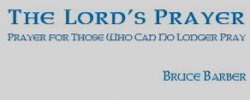Introduction
This is a ‘value-added’ study series based on an excellent online resource on the New Testament from Professor Dale Martin at Yale University, and complements a similar Yale course on the Old Testament also adapted for IF.
This undergraduate course outlines many important considerations scholars bring to reading the New Testament, as well as covering providing an introduction to the content of the New Testament. The course should be particularly useful for introducing lay people to modern historical critical methods developed over the last two centuries for interpreting these texts.
The whole series and its associated resources can be found in its original form on the Yale site. The ‘Sessions’ tab on that page brings up the full list of lectures, and clicking on each brings up the video, an audio-only version, transcription text, and any other resources (occasional handouts, etc.) relating to that session.
This IF version uses the Yale videos and a version of the Yale transcript reformatted into an easily printable PDF with paragraph numbering for easy reference in conversation groups. The main supplementary material is gathered together on one web page for each part, and a few other resources are also provided to build on the Yale material.
For an introduction to the series and presenting it in your local context, download our introductory document:
The studies can be done in one continuous series. It is, however, quite long, and so a break-up of the material into four parts is suggested below (the break-up is not part of the original series)
Preparing for the discussions
Prior to each session, watch the lecture via the links below, or read the transcript. There is also an audio-only version of the lectures available on the course homepage under the ‘sessions’ tab — click on the session you want and the audio can be downloaded at the bottom of the session page.
The collection of lecture transcripts can be downloaded individually from the session details below, or as a zipped file here:
There is often a section of biblical text which it would be helpful to read in conjunction with Martin’s lectures. This is indicated in the session details below, along with other reading or video resources which might complement the material.
The Yale material is reproduced here according to the associated terms of use.
Other resources
Bible
- Prof Martin suggests the New Revised Standard Bible (NRSV) as the version of the Bible for the course. There is no need to purchase this version; the text of the NRSV is available online at, for example, the Oremus Bible Broswer, should you need it.
- The edition of the NRSV Martin refers to in the first lecture is the latest (5th) edition of the New Oxford Annotated Bible with Apocryhpa, which is probably most accessible to Australians via Angus and Robertson (Ebay) – about $AU61 (April 2021). This has extensive interpretative footnotes to the biblical text and a number of essays on themes of NT interpretation. It is a similar price on Book Depository, and bit cheaper there for the paperback version. (Take care not to purchase the much cheaper Apocrypha-only version!). The Kindle version of the full Bible is about $22.
Commentary
- Prof Martin has turned his lectures into a book, available here in paperback and Kindle versions. The text, however, does not extend greatly beyond the online lectures/transcripts.
- If you would like more reading to complement what we hear in the lectures, perhaps better (at least, with a different voice) might be Pheme Perkin’s Reading the New Testament (Kindle, paperback, $15-35 plus postage); probably cheaper at Book Depository.
- For the intrepid, Tom Wright’s New Testament in its World is a massive book covering similar ground in much greater than a single lecture series could. This is available on Amazon (international stock) here but the best source for Australians might be Koorong (about $70 posted). Take care not to order the much cheaper ‘Workbook’ companion volume by mistake!
The Study Materials
[Part 1 – Introduction to the Study of the NT]
- Session 1 – Introduction: Why Study the New Testament? Video 1; lecture transcript
- Session 2 – From Stories to Canon Video 2; lecture transcript
- Some might be interested in some extensive YouTube/video material from Robert Jenson on the theme of the canon and its relationship to the creeds: Illuminating Faith – Scripture, Canon, Creed
- Prof Martin makes passing reference to the Greek translation of the Hebrew Bible (Old Testament) in this lecture. The Septuagint (meaning ‘70’ and abbreviated with the Roman numerals LXX), is important for the interpretation of the New Testament because it is the text (rather than the Hebrew) which NT authors cite. A quick (2.5 min) video overview can be found in the Museum of the Bible introduction; Andrew Perrin’s longer (15min) intro is here. A brief text overview of the LXX can be found in this Encyclopedia Britannica article; the Wikipedia page is more extensive. And you can read the LXX (in English!) here.
[Part 2 – Jesus and the Gospels]
- Session 7 – The Gospel of Matthew Video 7; lecture transcript
- Bible: Gospel according to Matthew
- The Bible Project’s summary of Matthew’s Gospel: Part 1 and Part 2
- Gospel Parallels: A useful resource for the study of the four Gospels is a gospel parallel. This sets corresponding passages from the various canonical Gospels next to each other for comparison of the passages in each. A gospel parallel is probably best presented as a printed hardcopy document. An online version that does some of the work can be found here. This particular resource lists the parallel passages by chapter and verse in the columns. The actual text(s) for these references are found by clicking/tapping on the numbered link in the leftmost column, which jumps to the parallel texts at the Bible Gateway site. These passages can be read not next to each other (which printed book versions enable) but above/below each other, which is less satisfactory than a book version but saves trying to hold 3 or 4 bookmarks in place in your home Bible and then flipping back and forth between them! You will also see that it is possible to change the Bible version for the passages via the drop-down menu at the top of the passage; changing one changes them all for that parallel selection.
[Part 3 – Paul and Friends]
[Part 4 – Apocalypse and Interpretation]
Session 26 – The “Afterlife” of the New Testament and Postmodern Interpretation Video 26; lecture transcript
 A valuable resource from Geoff Thompson for congregational study – particularly in the Uniting Church – is a publication connected with the UCA’s current (2022 +/-) ACT2 project.
A valuable resource from Geoff Thompson for congregational study – particularly in the Uniting Church – is a publication connected with the UCA’s current (2022 +/-) ACT2 project.


 Bruce Barber’s The Apostles’ Creed is a reading of the Creed for today, with particular focus on the assumptions the modern mind brings to the Creed and how the Creed, and the faith it symbolises challenge those assumptions.
Bruce Barber’s The Apostles’ Creed is a reading of the Creed for today, with particular focus on the assumptions the modern mind brings to the Creed and how the Creed, and the faith it symbolises challenge those assumptions.